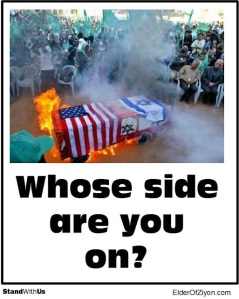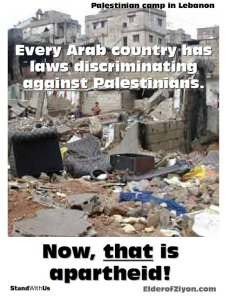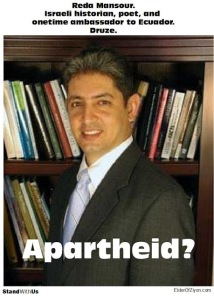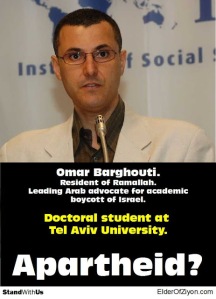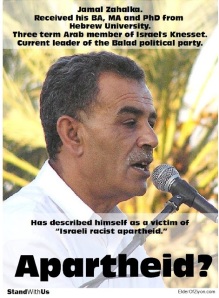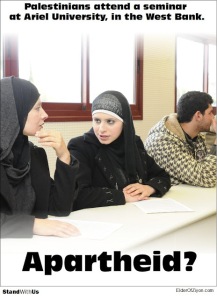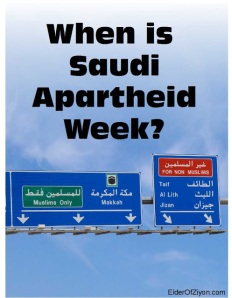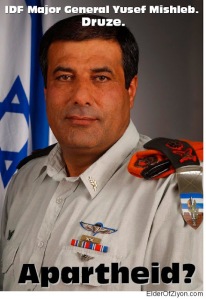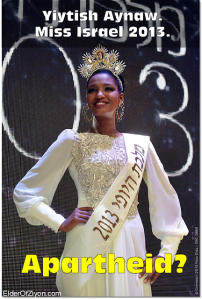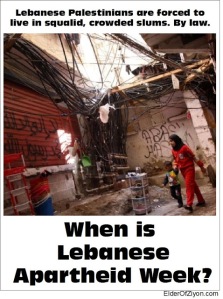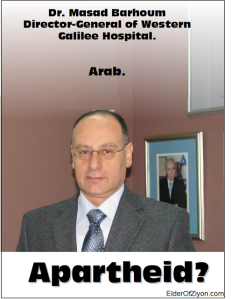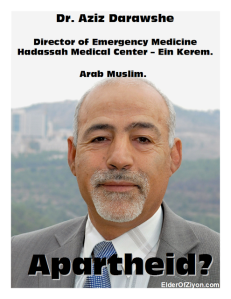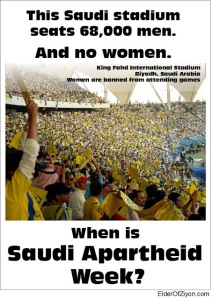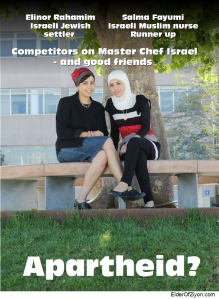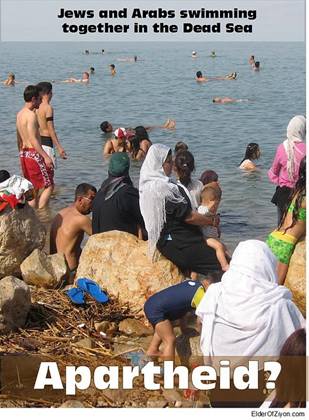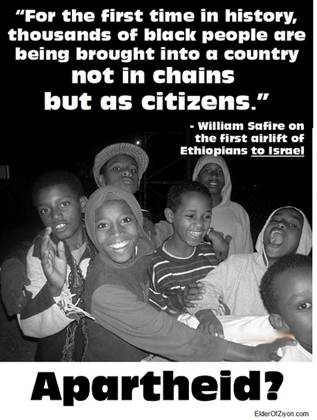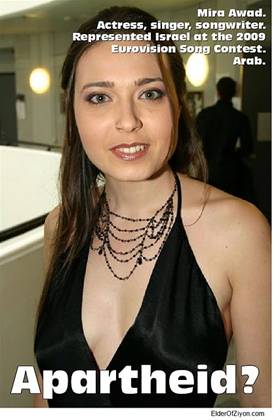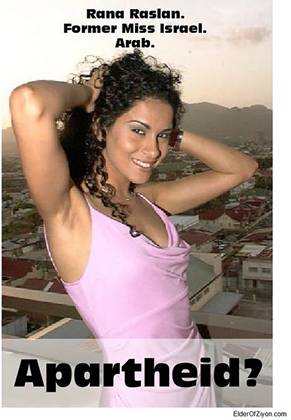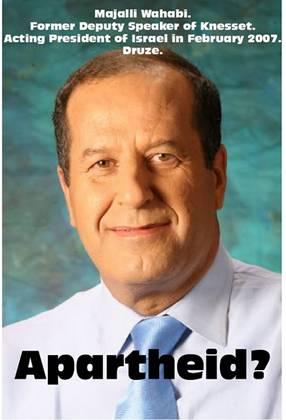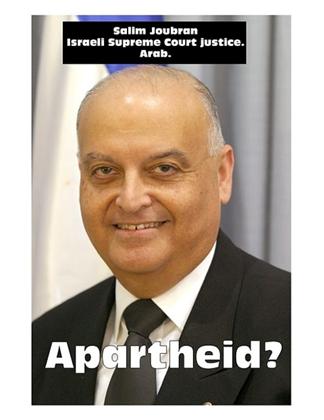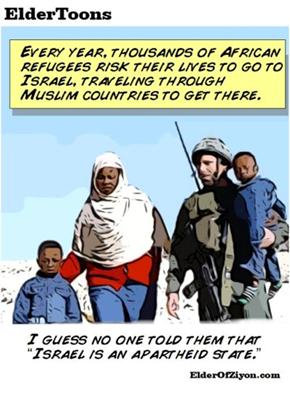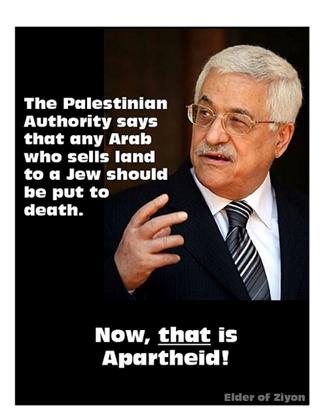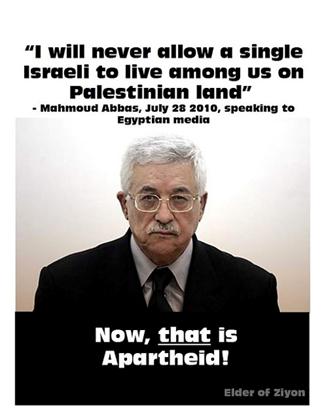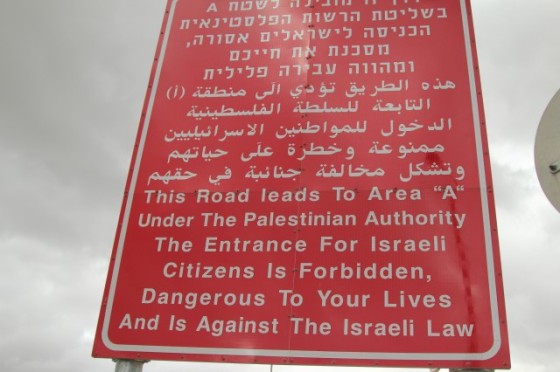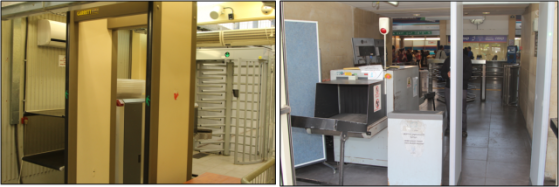_________________________________
Israel’s presence in the west bank is not illegal. It is the result of Arab and Palestinian aggression. Israel did not seek to expand into the West Bank. The area fell to Israel during Israel’s defensive war in 1967. Under customary law and the Hague conventions, Israel was obligated to administer the area until peace was achieved. UN resolution 242 (1967) assumed Israel would administer the territories until Arab countries were willing to negotiate new, more secure borders. The Palestinian authority has delayed continuing negotiations to determine future borders. in the meantime, Israel continues to face terrorist threats from the area, necessitating its presence. when Palestinian leaders finally say yes to peace, new, secure borders can be established.
Every discussion about Gaza must begin with the hard fact that Hamas is engaged in a genocidal war against Israel. Control of air space, water, and borders is essential in any war, especially a war of genocidal intentions led by fanatical leadership like Hamas. Israel has had no presence in Gaza since august of 2005. Gaza is governed solely by Hamas with support from Iran. Israel imposed border, air, and naval controls to ensure that Hamas does not import weapons for terrorism. The Gaza strip is on the same beautiful Mediterranean coast as Tel Aviv. imagine what a prosperous tourist spot it could be if Gaza’s government focused on state-building and peace instead of rocket building and war.
Israel’s wall is not illegal nor a violation of human rights. The international court of justice decision about the wall was widely criticized because it ignored a crucial fact—why Israel originally built the security fence. Israel built the fence for one reason only: to protect Israeli civilians from the relentless Palestinian terrorist war launched in 2000. The security fence was built to separate suicide bombers and other terrorists from their intended victims. Before its construction, no manmade or natural barrier kept terrorists from simply walking into Israel to detonate themselves in buses, restaurants, hotels, and schools. dozens of countries, including India, Spain, the U.S., the Czech Republic, South Korea, and others, use similar barriers to protect their countries and their citizens. The international court of justice could not dispute the fact that the security fence has actually served human rights. It has saved lives. Israeli fatalities from terrorism in Israel dropped by close to 100 percent after the fence was built.
When will Israel remove checkpoints, which inconvenience the Palestinian people? Israel will remove checkpoints when they are no longer needed. The checkpoints unfortunately inconvenience ordinary Palestinians, just as security checks at American airports and borders inconvenience all travelers. Security checkpoints are there to save innocent lives. Like other democracies, Israel implemented policies to protect its citizens. it set up checkpoints during the height of the Palestinian terrorist campaign, which murdered and maimed thousands of Israeli citizens. The number of checkpoints rises or falls with the degree of the terrorist threat. since late 2009 Israel has been able to dramatically reduce the number of checkpoints as terrorist attempts have decreased.
The practice of apartheid cannot be applied to Israel, and to say so is a misuse of the term. War does create unpleasant conditions. Building a security wall and administering hostile territory until peace is possible is not “apartheid.” it is common sense. Israel’s security fence was built in response to terrorism. Its purpose is not to separate people by race, religion, or nationality but to separate terrorists from their targeted victims. nor does Israel employ apartheid against Palestinians in the West Bank and Gaza. The Palestinians are not Israeli citizens and do not wish to be.
Hamas in Gaza and the Palestinian authority in the west bank have their own governments. Israel does not employ anything resembling apartheid within Israel. While Israel, like all multi-ethnic democracies, struggles to integrate its minorities more fully, its laws and programs try to eradicate, not enforce, disadvantages and discrimination. “Apartheid” applies more appropriately to those who dream of a Jew-free state of Palestine.
(from Stand With Us)
______________________________________
October 13, 2014
“Is Israel an “apartheid state,” as its enemies claim?
Who better to answer that charge than a Black South African who lived through apartheid?
Kenneth Meshoe, a member of the South African parliament, fits that bill.
He examines the evidence against Israel and draws a compelling conclusion.
______________________________________
March 4, 2010
Let’s Have a Real Apartheid Education Week
Alan Dershowitz
Criminal and civil liberties lawyer
Every year at about this time, radical Islamic students–aided by radical anti-Israel professors–hold an event they call “Israel Apartheid Week.” During this week, they try to persuade students on campuses around the world to demonize Israel as an apartheid regime. Most students seem to ignore the rantings of these extremists, but some naïve students seem to take them seriously. Some pro-Israel and Jewish students claim that they are intimidated when they try to respond to these untruths. As one who strongly opposes any censorship, my solution is to fight bad speech with good speech, lies with truth and educational malpractice with real education.
Accordingly, I support a “Middle East Apartheid Education Week” to be held at universities throughout the world. It would be based on the universally accepted human rights principle of “the worst first.” In other words, the worst forms of apartheid being practiced by Middle East nations and entities would be studied and exposed first. Then the apartheid practices of other countries would be studied in order of their seriousness and impact on vulnerable minorities.
Under this principle, the first country studied would be Saudi Arabia. That tyrannical kingdom practices gender apartheid to an extreme, relegating women to an extremely low status. Indeed, a prominent Saudi Imam recently issued a fatwa declaring that anyone who advocates women working alongside men or otherwise compromises with absolute gender apartheid is subject to execution. The Saudis also practice apartheid based on sexual orientation, executing and imprisoning gay and lesbian Saudis. Finally, Saudi Arabia openly practices religious apartheid. It has special roads for “Muslims only.” It discriminates against Christians, refusing them the right to practice their religion openly. And needless to say, it doesn’t allow Jews the right to live in Saudi Arabia, to own property or even (with limited exceptions) to enter the country. Now that’s apartheid with a vengeance.
The second entity on any apartheid list would be Hamas, which is the de facto government of the Gaza Strip. Hamas too discriminates openly against women, gays, Christians. It permits no dissent, no free speech, and no freedom of religion.
Every single Middle East country practices these forms of apartheid to one degree or another. Consider the most “liberal” and pro-American nation in the area, namely Jordan. The Kingdom of Jordan, which the King himself admits is not a democracy, has a law on its books forbidding Jews from becoming citizens or owning land. Despite the efforts of its progressive Queen, women are still de facto subordinate in virtually all aspects of Jordanian life.
Iran, of course, practices no discrimination against gays, because its President has assured us that there are no gays in Iran. In Pakistan, Sikhs have been executed for refusing to convert to Islam, and throughout the Middle East, honor killings of women are practiced, often with a wink and a nod from the religious and secular authorities.
Every Muslim country in the Middle East has a single, established religion, namely Islam, and makes no pretense of affording religious equality to members of other faiths. That is a brief review of some, but certainly not all, apartheid practices in the Middle East.
Now let’s turn to Israel. The secular Jewish state of Israel recognizes fully the rights of Christians and Muslims and prohibits any discrimination based on religion (except against Conservative and Reform Jews, but that’s another story!) Muslim and Christian citizens of Israel (of which there are more than a million) have the right to vote and have elected members of the Knesset, some of whom even oppose Israel’s right to exist. There is an Arab member of the Supreme Court, an Arab member of the Cabinet and numerous Israeli Arabs in important positions in businesses, universities and the cultural life of the nation. A couple of years ago I attended a concert at the Jerusalem YMCA at which Daniel Barrenboim conducted a mixed orchestra of Israeli and Palestinian musicians. There was a mixed audience of Israelis and Palestinians, and the man sitting next to me was an Israeli Arab, who is the culture minister of the State of Israel. Can anyone imagine that kind of concert having taking place in apartheid South Africa, or in apartheid Saudi Arabia?
There is complete freedom of dissent in Israel and it is practiced vigorously by Muslims, Christians and Jews alike. And Israel is a vibrant democracy.
What is true of Israel proper, including Israeli Arab areas, is not true of the occupied territories. Israel ended its occupation of the Gaza several years ago, only to be attacked by Hamas rockets. Israel maintains its occupation of the West Bank only because the Palestinians walked away from a generous offer of statehood on 97% of the West Bank, with its capital in Jerusalem and with a $35 billion compensation package for refugees. Had it accepted that offer by President Bill Clinton and Prime Minister Ehud Barak, there would be a Palestinian state in the West Bank. There would be no separation barrier. There would be no roads restricted to Israeli citizens (Jews, Arabs and Christians.) And there would be no civilian settlements. I have long opposed civilian settlements in the West Bank, as many, perhaps most Israelis, do. But to call an occupation, which continues because of the refusal of the Palestinians to accept the two-state solution, “Apartheid” is to misuse that word. As those of us who fought in the actual struggle of apartheid well understand, there is no comparison between what happened in South Africa and what is now taking place on the West Bank. As Congressman John Conyors, who helped found the congressional Black caucus, well put it:
“[Applying the word “Apartheid” to Israel] does not serve the cause of peace, and the use of it against the Jewish people in particular, who have been victims of the worst kind of discrimination, discrimination resulting in death, is offensive and wrong.”
The current “Israel Apartheid Week” on universities around the world, by focusing only on the imperfections of the Middle East’s sole democracy, is carefully designed to cover up far more serious problems of real apartheid in Arab and Muslim nations. The question is why do so many students identify with regimes that denigrate women, gays, non-Muslims, dissenters, environmentalists and human rights advocates, while demonizing a democratic regime that grants equal rights to women (the chief justice and speaker of the Parliament of Israel are women), gays (there are openly gay generals in the Israeli Army), non-Jews (Muslims and Christians serve in high positions in Israel) and dissenters, (virtually all Israelis dissent about something). Israel has the best environmental record in the Middle East, it exports more life saving medical technology than any country in the region and it has sacrificed more for peace than any country in the Middle East. Yet on many college campuses democratic, egalitarian Israel is a pariah, while sexist, homophobic, anti-Semitic, terrorist Hamas is a champion. There is something very wrong with this picture.
_____________________________________________
January 21, 2014
Palestine is a Geographical Area, Not a Nationality
Myths and Facts
Eli E. Hertz
The Arabs invented a special national entity in the 1960s called the Palestinians, specifically for political gain. They brand Israelis as invaders and claim the geographic area called Palestine belongs exclusively to the Arabs.
The word Palestine is not even Arabic. It is a word coined by the Romans around 135 CE from the name of a seagoing Aegean people who settled on the coast of Canaan in antiquity – the Philistines. The name was chosen to replace Judea, as a sign that Jewish sovereignty had been eradicated following the Jewish revolts against Rome.
In the course of time, the Latin name Philistia was further bastardized into Palistina or Palestine. During the next 2,000 years, Palestine was never an independent state belonging to any people, nor did a Palestinian people, distinct from other Arabs, appear during 1,300 years of Muslim hegemony in Palestine under Arab and Ottoman rule.
Palestine was and is solely a geographic name. Therefore, it is not surprising that in modern times the name ‘Palestine’ or ‘Palestinian’ was applied as an adjective to all inhabitants of the area between the Mediterranean Sea and the Jordan River – Palestine Jews and Palestine Arabs alike. In fact, until the 1960s, most Arabs in Palestine preferred to identify themselves merely as part of the great Arab nation or citizens of “southern Syria.”
The term ‘Palestinian’ as a noun was usurped and co-opted by the Arabs in the 1960s as a tactic initiated by Yasser Arafat to brand Jews as intruders on someone else’s turf. He presented Arab residents of Israel and the Territories as indigenous inhabitants since time immemorial. This fabrication of peoplehood allowed Palestinian Arabs to gain parity with the Jewish people as a nation deserving of an independent state.
Historically, Before the Arabs Fabricated the Palestinian People as an Exclusively Arab Phenomenon, No Such Group Existed
Countless official British Mandate-vintage documents speak of ‘the Jews’ and ‘the Arabs’ of Palestine – not ‘Jews and Palestinians.’
Ironically, before local Jews began calling themselves Israelis in 1948 (the name ‘Israel’ was chosen for the newly-established Jewish state), the term ‘Palestine’ applied almost exclusively to Jews and the institutions founded by new Jewish immigrants in the first half of the 20th century, before independence.
Some examples include:
• The Jerusalem Post, founded in 1932, was called the Palestine Post until 1948.
• Bank Leumi L’Israel was called the “Anglo-Palestine Bank, a Jewish Company.”
• The Jewish Agency – an arm of the Zionist movement engaged in Jewish settlement since 1929 – was called the Jewish Agency for Palestine.
• The house organ of American Zionism in the 1930s was called New Palestine.
• Today’s Israel Philharmonic Orchestra, founded in 1936 by German Jewish refugees who fled Nazi Germany, was called the “Palestine Symphony Orchestra, composed of some 70 Palestinian Jews.”
• The United Jewish Appeal (UJA) was established in 1939 as a merger of the United Palestine Appeal and the fundraising arm of the Joint Distribution Committee.
Encouraged by their success at historical revisionism and brainwashing the world with the ‘Big Lie’ of a Palestinian people, Palestinian Arabs have more recently begun to claim they are the descendants of the Philistines and even the Stone Age Canaanites. Based on that myth, they can claim to have been ‘victimized’ twice by the Jews: In the conquest of Canaan by the Israelites and by the Israelis in modern times – a total fabrication.
Archeologists explain that the Philistines were a Mediterranean people who settled along the coast of Canaan in 1100 BCE. They have no connection to the Arab nation, a desert people who emerged from the Arabian Peninsula.
Contradictions abound, Palestinian leaders claim to be descended from the Canaanites, the Philistines, the Jebusites and the first Christians. They also co-opt Jesus and ignore his Jewishness, at the same time claiming the Jews never were a people and never built the Holy Temples in Jerusalem.
There Has Never Been a Sovereign Arab State in Palestine
The artificiality of a Palestinian identity is reflected in the attitudes and actions of neighboring Arab nations who never established a Palestinian state. It also is expressed in the utterances and loyalties of so-called Palestinians.
Only twice in Jerusalem’s history has it served as a national capital. The first time was as the capital of the two Jewish Commonwealths during the First and Second Temple periods, as described in the Bible, reinforced by archaeological evidence and numerous ancient documents.
The second time is in modern times as the capital of the State of Israel. It has never served as an Arab capital for the simple reason that there has never been a Palestinian Arab state.
The rhetoric by Arab leaders on behalf of the Palestinians rings hollow, for the Arabs in neighboring lands, who control 99.9 percent of the Middle East land, have never recognized as a Palestinian entity. They have always considered Palestine and its inhabitants part of the great ‘Arab nation,’ historically and politically as an integral part of Greater Syria.
The Arabs never established a Palestinian state when the UN offered a partition plan in 1947 to establish “an Arab and a Jewish state” (not a Palestinian state, it should be noted). Nor did the Arabs recognize or establish a Palestinian state during the two decades prior to the Six-Day War when the West Bank was under Jordanian control and the Gaza Strip was under Egyptian control; nor did the Palestinians clamor for autonomy or independence during those years under Jordanian and Egyptian rule.
Well before the 1967 decision to create a new Arab people called ‘Palestinians,’ when the word ‘Palestinian’ was associated with Jewish endeavors, Auni Bey Abdul-Hadi, a local Arab leader, testified in 1937 before a British investigative body – the Peel Commission – saying: “There is no such country [as Palestine]! Palestine is a term the Zionists invented! There is no Palestine in the Bible. Our country was for centuries, part of Syria.”
_______________________________
Mordechai Kedar: defeat Islamist/leftist campaign to conquer democracy via Palestinianism
_______________________________
Israel’s Amazing Social Tapestry
Pictures compiled by http://www.standwithus.org
_______________________________________
Reality check: The truth behind crossings in Judea and Samaria
IDF spokesperson
May 6, 2013
The crossings and IDF checkpoints in Judea and Samaria have been the source of much confusion and debate worldwide. Crossings and checkpoints, while both provide important security benefits, are different. Crossings are facilities used by Palestinians to enter from Judea and Samaria into other regions of Israel. Checkpoints, on the other hand, operate during times of heightened security risk to prevent terrorists from executing their plans to harm civilians. The international media have often portrayed these security measures as a way to restrict Palestinians’ freedom of movement and abuse civil rights. They have occasionally been referred to as ‘inhumane’. Despite attention on the region, most facts about the crossings and checkpoints are widely unknown. How many checkpoints are still active? Just how successful are they in preventing terror attacks? What type of security checks occur? Are Palestinians able to move freely? Today, the reality is far from what you may have heard.
How many crossings and checkpoints are there today?
There are some 15 crossings between Judea and Samaria and other parts of Israel. Some are used for the passage of people, others for the passage of goods. In addition to these crossings, 12 checkpoints are placed strategically throughout Israel’s Central Command region, and operate in time of need in light of security considerations.
Checkpoints – Preventing terror, saving lives
Capt. Barak Raz, spokesperson for the Judea and Samaria Division, describes the situation in Judea and Samaria as relatively stable.
“Today, we take into account incidents such as throwing stones, which can be fatal, and we also have the resources to improve road safety. Ten years ago, nobody was keeping track of all this because there was a terror attack every week.”
Last year marked the first year since 1973 in which no Israelis were killed in Judea and Samaria. Compare this to 2002, in which 47 terror attacks left 452 Israeli civilians dead.
Checkpoints have been used as a method to filter out and prevent terror attacks before would-be Palestinian attackers have a chance to enter Israel. As a result of such insidious methods as female suicide bombers hiding explosives under their clothing and the use of ambulances to conceal and transport terrorist weapons, routine checks have been intensified at all types of crossings.
The number of terror attacks has fallen drastically since the construction of the security fence in 2006.
The IDF has withdrawn the majority of its checkpoints in Judea and Samaria in a step towards beginning a positive cycle, Capt. Raz explains:
“The Palestinians have realized that the path of terror led them nowhere. We can explain this relative calm in three ways: the reduction of military presence during routine security tasks, an effective counter-terrorism strategy, and a clear economic incentive for Palestinians to maintain the calm. By reducing the number of checkpoints, we can provide much more freedom of movement, therefore improving the economic conditions and ultimately strengthening the security situation.”
From 40 to 12 checkpoints
The number of checkpoints in the Central Command went from 40 in July 2008 to just 12 in October 2012. Furthermore, these checkpoints are only used some of the time and the frequency of checks is dependent on the security threat at the time.
Barak Raz explains that the relative calm in the region has been brought about by the success of security measures which routinely prevent attempted attacks.
“Despite the calm, the willingness to carry out terror attacks is still present, but we are able to counter them better. This may seem paradoxical since there are fewer checkpoints. However, we use the 12 points as soon as we receive the warning of an imminent threat. Every vehicle at each location is then checked. In approximately thirty minutes, we stop the suspects and the situation returns to normal.”
Freedom of Movement
Separate roads are used to enter Palestinian and Israeli communities. It is important to remember that Israeli vehicles are prohibited from entering roads leading to Area “A” (the area under full civil and security control of the Palestinian Authority) just as Palestinian vehicles are not permitted to leave Judea and Samaria in order to enter into Israel.
Sign prohibiting entry to Israeli vehicles into Area “A”.
The main roads linking Palestinian cities, including Route 60, are freely accessible and free of security controls. A Palestinian civilian can travel from Jenin to Bethlehem without encountering a single military checkpoint.
Some people who have traveled the roads in Judea and Samaria and seen yellow barriers on the side of the road have mistaken them for checkpoints. Capt. Raz explains the surprising truth behind these barriers: they are used to save Palestinian lives.
“Today we face more and more problems with road safety. Many residents of Palestinian villages try to take shortcuts and enter onto main roadsfrom small dirt roads beside of their homes,” Capt. Raz explains. “This is dangerous for both Israeli and Palestinian drivers. Road accidents have become the leading cause of death among Palestinians in Judea and Samaria. To counter this, we installed the yellow barriers to restrict access [to the main roads] to other vehicles.”
Crossings: 9.4 million entries in 2012
Crossings are the main points of entry between Judea and Samaria and other parts of Israel. Ceratin crossings – such as Bituniya – are intended for the inspection and transfer of goods.
There are also crossings intended for the passage of Palestinian civilians such as those at Kalandia and Hashmonaim. These crossings have received much criticism for alleged violations of human rights. Is this criticism justified?
Who is allowed to enter and who is not?
Every Palestinian wishing to visit relatives or work inside Israel must contact the office of the Coordinator of Government Activities in the Territories (COGAT).
“Our role is to ensure the safety of every Palestinian civilian, that he or she has freedom of movement and economic access,” says Maj. Amos Zuaretz, Head of crossings in COGAT.
Obtaining an entry permit is a simple two-step process. Palestinians must first obtain a biometric card at any of the 31 COGAT offices in Judea and Samaria. The applicant receives the card – designed to ease waiting times at crossings – five minutes after filling out the form.
Next, one wishing to obtain permission to cross must apply to a Palestinian Authority liaison officer who makes contact with the Israeli authorities. The vast majority of applications are processed and approved within 24 hours.
There are 74 types of authorization, which vary according to the type of activity and permit duration. The two most requested permits are humanitarian permits and commercial permits.
What is the procedure at crossings once authorization is approved?
This is actually quite straightforward and would be familiar to anyone who has entered any airport in the world. Each person must first pass through a metal detector and pass their bags through a scanner, just as every Israeli citizen or tourist must at any of Israel’s train stations. At this stage, there is no physical contact with soldiers. Most Palestinians already know the procedure. Soldiers oversee everything from an isolated control room and communicate via intercom.
Left: Hashmonaim Crossing entrance. Right: Tel Aviv Central Train Station entrance.
After that, each person’s card is reviewed by a COGAT official who takes a digital fingerprint scan. Lastly, a soldier verifies that the permit is in order and authorizes entry.
“In 2012, there were 9.4 million entries at all crossings combined. This figure has been rising steadily since 2010,” says Maj. Zuaretz.
Identity and permit verification at the Hashmonaim Crossing.
When that person returns home later on, he/she simply passes his/her magnetic card through a scanner and walks through a turnstile.
If all goes well, there is no actual contact between Palestinians and Israeli soldiers. The whole procedure takes five minutes once started. However, some crossings are widely used and lines can be long. An average of 15 thousand people use the Kalandia crossing each day and the majority of those people cross in the morning. In comparison, about 35 thousand individuals go through Ben Gurion International Airport every day. It is not uncommon to see relatively long lines like those at crossings in international airports.
475 Attempts to Smuggle Weapons
The various crossings and checkpoints have proven to be effective barriers against weapons smuggling and the crossing of illegal workers. In 2012, the Military Police Corps recorded a total of 475 attempts to smuggle weapons into Israel and 1,147 illegal attempts to enter Israel with forged ID cards. The Military Police and officers from the Ministry of Defense responsible for crossings have thwarted many attempted attacks and arrested dozens of people in possession of explosives. Most recently, on April 30, 2013, a 31-year-old Israeli civilian was stabbed to death at Tapuah Junction – the intersection of routes 60 and 505.
Although the situation is better than in the past, the ongoing presence of these checkpoints remains necessary. The proof is in the numbers.
__________________________________

